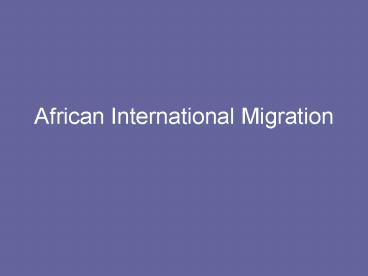African International Migration - PowerPoint PPT Presentation
1 / 18
Title:
African International Migration
Description:
... on average, across African countries, external debt constituted 60.7 ... Characteristics of African Immigrants to the US. Top sending countries. Nigeria (17 ... – PowerPoint PPT presentation
Number of Views:75
Avg rating:3.0/5.0
Title: African International Migration
1
African International Migration
2
African Regional Migration
- African peoples had a long history of migration
and movement.
3
(No Transcript)
4
African International Migration
- In the 1920s-1960s, mostly young African men went
overseas for a few years for education in the
former colonial powers (primarily England
France). - As a result of this highly revered education,
they assumed positions of political leadership
upon their return to their countries, as we see
in So Long a Letter.
5
African Immigration to the US
- African immigration into the US is part of the
new immigration since 1965. - Relatively small African-born population total
estimated population born in Africa (2000
Census) 881,000 (compared to a total US
population of 300 million those born in Latin
America 16 million).
6
Why did Africans begin migrating to the US in the
1980s and 1990s?
- Structural adjustment programs instituted by the
World Bank and the International Monetary Fund
(IMF). - In 1998, on average, across African countries,
external debt constituted 60.7 of GDP (gross
domestic product).
7
Why did Africans Migrate to the US in the 1980s
and 1990s?
- Changes in US immigration policy in 1990 that
encouraged African migration through diversity
visas (at the expense of countries that had had a
long history of immigration to the US like China
and Mexico). - Changes in the US economy greater inequality and
globalization of the economy encouraged the
expansion of the informal sector in the US,
particularly in cities (Stoller, p.17).
8
(No Transcript)
9
(No Transcript)
10
(No Transcript)
11
(No Transcript)
12
Characteristics of African Immigrants to the US
from the 2000 Census
- 55 male, 45 female
- 52 aged 25-44 median age 37
- 86 have high school diploma or higher 43 have
bachelors degree Africans are more highly
educated as a group than any other immigrant
group and the average American (US comparison is
83 HS, 24.5 college) - Brain-drain from Africa of nurses, doctors,
engineers, teachers, and other skilled workers
13
Characteristics of African Immigrants to the US
from the 2000 Census
- Median household income 41,198 (comparable to
native-born at 42,299). - Earn more than African-Americans (due to higher
educational levels on average), but less than
whites with comparable levels of education,
suggesting that they face problems in hiring in
the US (due to racial discrimination? Stereotypes
about Africans? Educational credentials not
translating?).
14
Characteristics of African Immigrants in the US
- Generally, when skilled Africans come to the US,
they experience downward mobility (working as
taxi drivers or in restaurants or as home health
aides). - Low rates of naturalization they tend to see
themselves as sojourners, sending remittances
home. - Formation of mutual aid societies or ethnic
associations
15
Chapel of the Restoration, the Bronx, Mission
from Africa, The New York Times, 8 April 2009
16
Characteristics of African Immigrants to the US
- Top sending countries
- Nigeria (17)
- Ethiopia (13)
- Ghana
- South Africa
17
Characteristics of African Migrants in North
America
- Top cities New York, Toronto, Washington DC,
Chicago, Atlanta, LA, Houston, Boston. - Africans tend to move to urban areas first, but
then as they become established, move to the
suburbs.
18
Are these characteristics also true of the West
African migrants described in Money Has No Smell?
- Male/female ratio?
- Age range?
- Education?
- Income?
- Mutual aid societies?
- Seeing themselves as sojourners?































